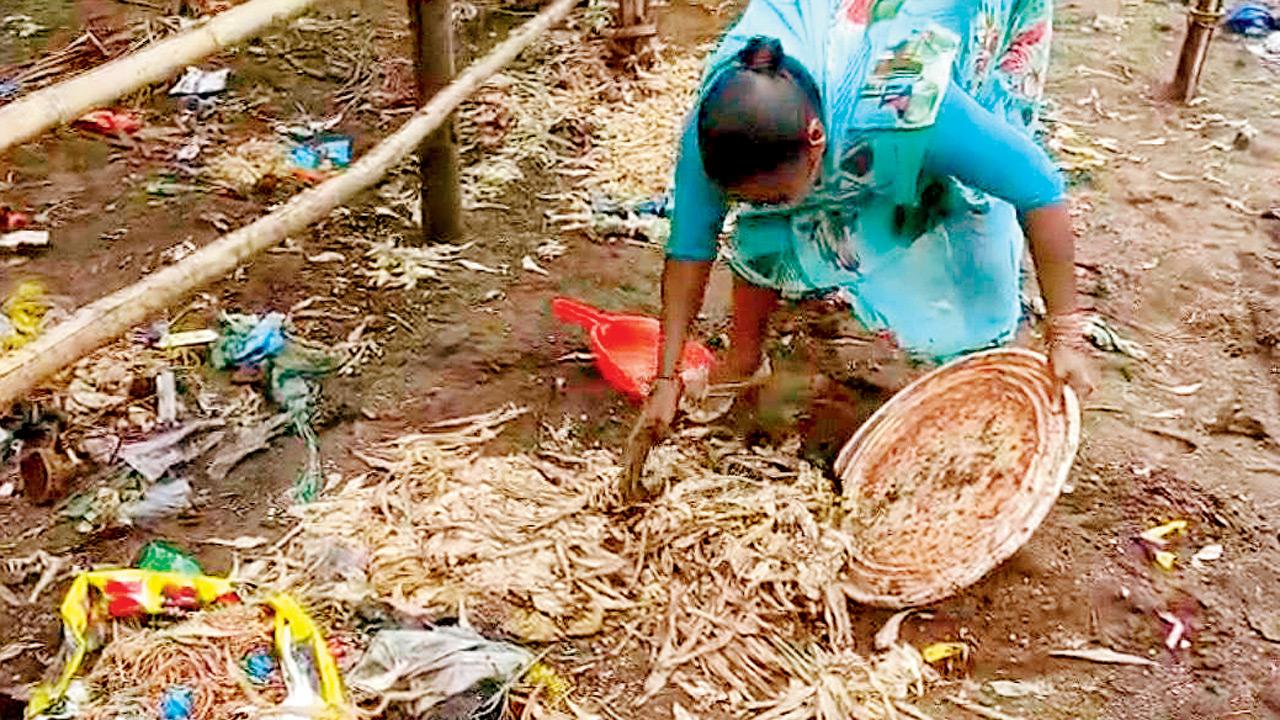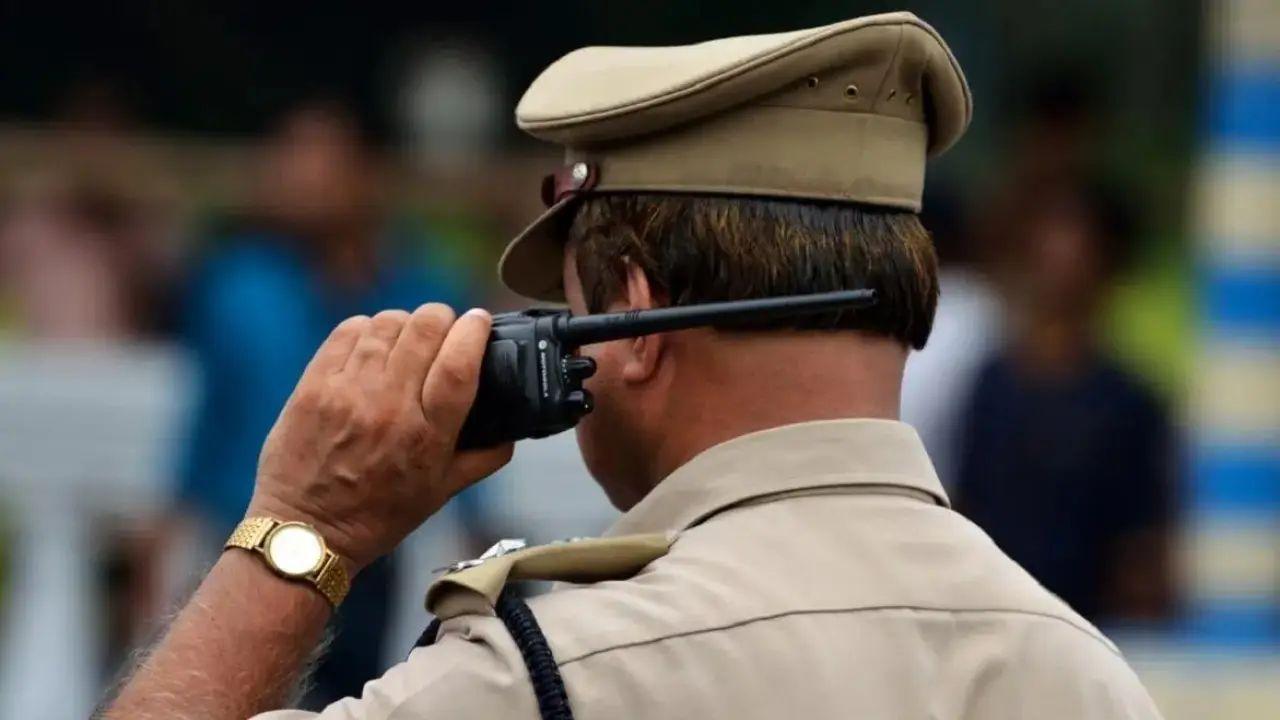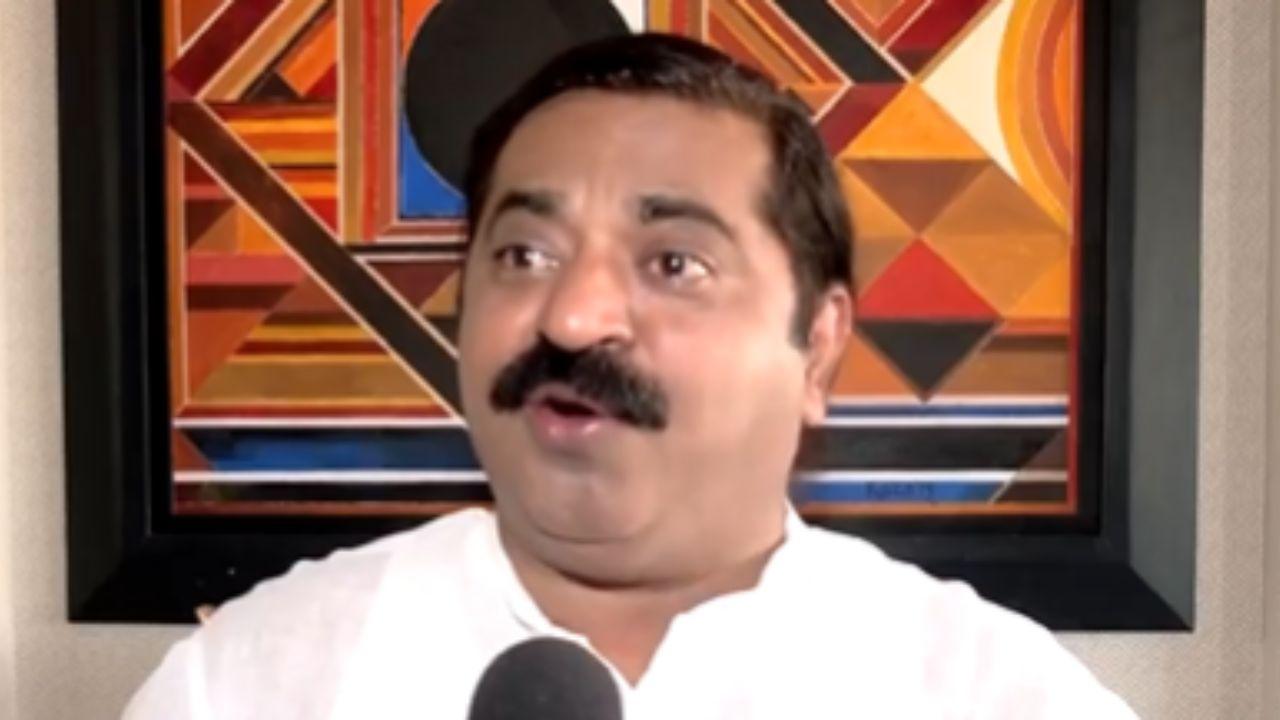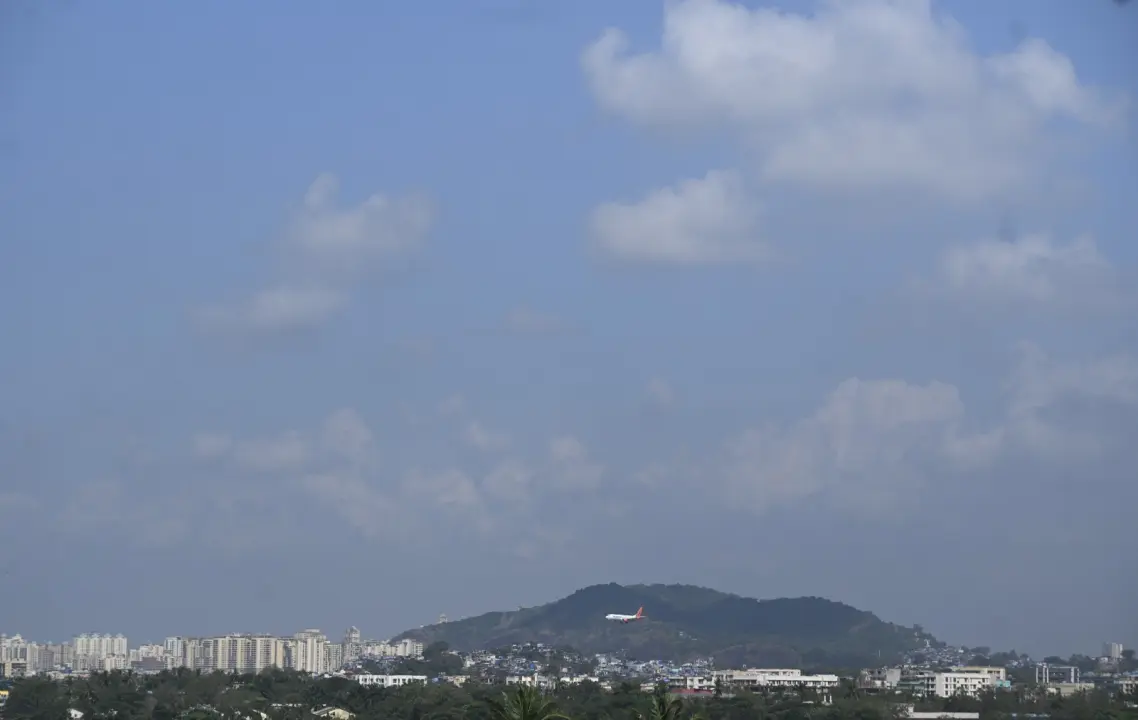For the fishing families scattered along Palghar’s 112-km coastline, the past few months have been devastating. From Dahanu to Vasai, continuous cyclones and unseasonal rains have washed away not just tonnes of dried fish but also the hopes, savings, and stability of nearly one lakh fisherfolk.
The downpour has ruined their dried fish stocks — the only source of income for thousands of women — leaving spoilage losses pegged at over Rs 100 crore. The community is not just fighting nature’s fury, but also what they call a cruel betrayal by the state government, which, despite granting the sector agricultural status, continues to deny them the disaster relief packages that farmers receive.
Fisherwomen at Arnala stand desolate amid the racks used for drying fish
“Since August, unseasonal rains have wreaked havoc on our fishing community. The government calls us farmers of the sea, but when our crop is destroyed by rain, no one comes forward to help,” said Jaywant Tandel, President of the Thane District Fishermen Central Cooperative Association.
The district’s coastal belt — including Zai, Arnala, Dahanu, Chinchani, Tarapur, Uccheli, Dandi, Navapur, Murbe, Satpati, Dativare, Edvan, Kore, Kalamb, Vasai, and Naigaon — is home to more than 35,000 women who dry and sell fish. For the fisherwomen, drying and selling fish is their primary source of income. Recently, the catch of bombil (Bombay duck), mandeli, and karandi had been good — offering hope that the dry fish trade would thrive. But the unseasonal rains dashed those hopes, leaving racks of dried fish soaked and decomposing.
The damage has forced fisherwomen to discard the rotting stock, leaving them in tears and trapped in crisis. “We worked for months — now we have nothing left,” said Lata Koli, a fisherwoman from Arnala, her voice heavy with despair. “Has anyone even asked us how painful it is to throw away everything we worked for?” asked Saraswati Patil, a fisherwoman from Satpati. To add to their crisis, stormy winds since August kept their boats ashore, sinking Rs 20,000 to Rs 50,000 in daily operational costs.
Fisherfolk have had to throw away stocks of dried prawns, among others, destroyed by the rain. PICS/MEGHA PARMAR
“Our boat damages cost around Rs 10–15 lakh, but we are given compensation of mere Rs 5000–10,000 for damage. Since the start of this fishing season, each fishing trip has resulted in a loss ranging from Rs 25,000 to Rs 2 lakh due to cyclones. Diesel, ice, labour — all wasted,” said Jaykumar Bhay, Director of the Maharashtra Fishermen’s Cooperative Apex Federation. “It’s not just the fish — our nets, boats, even the wooden racks we use to dry the fish have been damaged. We are in debt,” said a fisherman.
‘Agri status only on paper’
Palghar’s fisherfolk say their so-called agricultural recognition has brought them zero benefits. “Farmers get relief packages when their crops fail. We don’t even get a survey,” said Tandel. “In the aftermath of Cyclone Mantha, in Palghar and Thane district around 2000 boats with around 20,000 people working on them have been affected. The devastation has swept up over a lakh of fisherfolk.”
“We have been fighting for years to secure proper relief funds for the fishing community, but the compensation provided is far too little and fails to cover our major losses,” said Bhay. “The agricultural status given to us exists only on paper — we haven’t received a single benefit so far. Despite repeated letters, the fisheries department hasn’t even conducted a survey.”
Fishermen’s association representatives (from left) Jaykumar Bhay, Jaywant Tandel, and Nandkumar Vinde, who are awaiting government action
Members of the Maharashtra Machhimar Kruti Samitee have written to Chief Minister Devendra Fadnavis, Deputy CMs Eknath Shinde and Ajit Pawar, and Fisheries Minister Nitesh Rane, seeking a Rs 3000-crore relief package for those affected. Tandel recalled that a State Fisheries Policy Committee, once headed by former Union Minister Ram Naik, had recommended a Natural Disaster Management System for fisherfolk. “The committee was dissolved before action was taken — another betrayal,” he said.
Discrimination in Maharashtra
In states like Gujarat, Karnataka, and Goa, fisherfolk receive adequate and timely compensation for weather-related damages. But in Maharashtra, aid under the National Disaster Response Force (NDRF) is limited and inadequate, the community says.
“This government always discriminates against the fishing community in Maharashtra, specially the Thane/Palghar coast. We want the compensation in Maharashtra to be brought in line with the actual scale of losses sustained by fisherfolk due to cyclones and unseasonal rains,” said Jaykumar.
Despite the large-scale destruction, the fisheries department has not conducted any loss assessment (panchanama). Without official records, it is impossible to estimate the exact extent of the damage or the number of affected families. While the fishing community continues to fight to keep their cooperative sector alive, many are leaving the trade altogether due to mounting losses and inadequate government policies.
“I urge the department to assess the damage at the earliest; visit fishing societies and ports across Palghar and Thane to understand the ground reality and extend support to fishermen, boat owners, and fish vendors. Our community is looking to the government for much-needed relief,” said Tandel.
Only exceptional cases: Govt
Dinesh Patil, Assistant Commissioner of Fisheries for Thane-Palghar, explained, “As per the guidelines, there is no provision to compensate for damage to fish stock as of now — only for boats, nets or fish ponds. Compensation for loss of fish stock is granted only in exceptional cases, based on government discretion. However, we are doing our best to support the affected fishing community.”
He added that the department regularly issues timely weather alerts to help safeguard fishermen’s livelihoods and confirmed that a survey and loss assessment for the 93 boats damaged in May had been completed promptly. However, he acknowledged, “No boats have been reported damaged after May, as we had alerted the community in advance of the cyclone.”
An activist working with the Koli community for decades said, “The Kolis have been protecting and feeding this coast for generations without demanding charity. But now, the sun doesn’t shine long enough to dry fish, unseasonal rains and cyclones are destroying their stock, and development projects are eating into their land. They have never cried for help before — that’s why the government never noticed. Are we waiting for them to die of starvation before acting?”
The threats are piling up. Not only are fish becoming harder to find, but the community is also scared of losing their ancestral livelihood to large-scale infrastructure. “Lately, fish are getting difficult to find and with the development of Vadhavan and Jindal ports, fishermen fear for their livelihood,” Jaykumar said.
The fishing community has outlined a comprehensive list of demands for government assistance following the recent devastation. They have sought compensation ranging from Rs 5 lakh to Rs 25 lakh per boat for completely destroyed vessels, depending on engine capacity, and Rs 50,000 to Rs 5 lakh per boat for partially damaged ones.
For fishing nets, they have demanded Rs 1 lakh for those completely destroyed and Rs 25,000 for partially damaged nets. Additionally, they are seeking Rs 50,000 for non-mechanized and outboard engine boats, Rs 3 lakh for one-cylinder and two-cylinder boats, Rs 5 lakh for four-cylinder boats, and Rs 10 lakh for six-cylinder boats. Fisherwomen engaged in drying fish and women fish vendors have also requested Rs 50,000 each as assistance.
Boats worth Rs 5–50 lakh have received a meagre Rs 15,000 as relief — a move the community calls “a mockery of our suffering.” Adding to their woes, the sanctioned diesel quota for boats has been reduced from 8,349 last year to 7,796 this year, attributing it to the inability of most fishermen to afford insurance or mandatory renewals.
“The losses have hit not just fishermen but also the entire chain of livelihoods connected to dried fish trade. Despite repeated damage, we never receive fair compensation. The fishing community is always neglected. This time, we demand proper relief for the losses we’ve suffered,” Tandel added. For Maharashtra’s fisherfolk, the sea has always been both a provider and a risk. But as the rains grow harsher and relief remains elusive, the people who harvest the ocean’s wealth now find themselves sinking.











